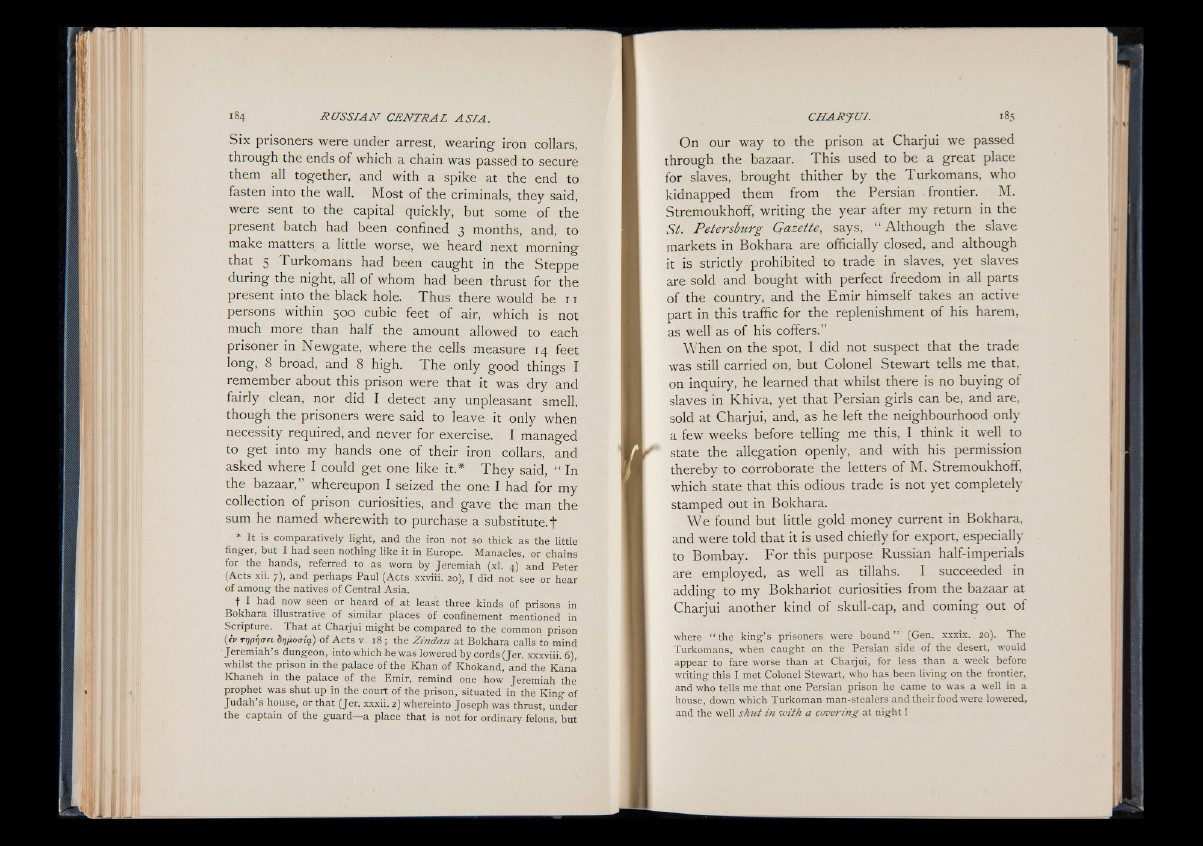
Six prisoners were under arrest, wearing iron collars,
through the ends of which a chain was passed to secure
them all together, and with a spike at the end to
fasten into the wall. Most o f the criminals, they said,
were sent to the capital quickly, but some of the
present batch had been confined 3 months, and, to
make matters a little worse, we heard next morning
that 5 Turkomans had been caught in the Steppe
during the night, all of whom had been thrust for the
present into the black hole. Thus there would be 11
persons within 500 cubic feet of air, which is not
much more than half the amount allowed to each
prisoner in Newgate, where the cells measure 14 feet
long, 8 broad, and 8 high. The only good things I
remember about this prison were that it was dry and
fairly clean, nor did I detect any unpleasant smell,
though the prisoners were said to leave it only when
necessity required, and never for exercise. I managed
to get into my hands one of their iron collars, and
asked where I could get one like it.* They said, “ In
the bazaar,” whereupon I seized the one I had for my
collection of prison curiosities, and gave the man the
sum he named wherewith to purchase a substitute, f
* It is comparatively light, and the iron not so thick as the little
finger, but I had seen nothing like it in Europe. Manacles, or chains
for the hands, referred to as worn by Jeremiah (xl. 4) and Peter
(Acts xii. 7), and perhaps Paul (Acts xxviii. 20), I did not see or hear
of among the natives of Central Asia.
t I had now seen or heard of at least three kinds of prisons in
Bokhara illustrative of similar places of confinement mentioned in
Scripture. That at Chaijui might be compared to the common prison
{¿V TT)pj(rci Sripocria) of Acts v. 18; the Zindan at Bokhara calls to mind
Jeremiah’s dungeon, into which he was lowered by cords (Jer. xxxviii. 6),
whilst the prison in the palace of the Khan of Khokand, and the Kan a
Khaneh in the palace of the Emir, remind one how Jeremiah the
prophet was shut up in the court of the prison, situated in the King of
Judah s house, or that (Jer. xxxii. 2) whereinto Joseph was thrust, under
the captain of the guard—-a place that is not for ordinary felons, but
On our way to the prison at Charjui we passed
through the bazaar. This used to be a great place
for slaves, brought thither by the Turkomans, who
kidnapped them from the Persian frontier. M.
Stremoukhoff, writing the year after my return in the
St. Petersburg Gazette, says, “ Although the slave
markets in Bokhara are officially closed, and although
it is strictly prohibited to trade in slaves, yet slaves
are sold and bought with perfect freedom in all parts
of the country, and the Emir himself takes an active
part in this traffic for the replenishment of his harem,
as well as of his coffers.”
When on the spot, I did not suspect that the trade
was still carried on, but Colonel Stewart tells me that,
on inquiry, he learned that whilst there is no buying of
slaves in Khiva, yet that Persian girls can be, and are,
sold at Charjui, and, as he left the neighbourhood only
a few weeks before telling me this, I think it well to
state the allegation openly, and with his permission
thereby to corroborate the letters of M. Stremoukhoff,
which state that this odious trade is not yet completely
stamped out in Bokhara.
W e found but little gold money current in Bokhara,
and were told that it is used chiefly for export, especially
to Bombay. For this purpose Russian half-imperials
are employed, as well as tillahs. I succeeded in
adding to my Bokhariot curiosities from the bazaar at
Charjui another kind of skull-cap, and coming out of
where “ the king’s prisoners were bound” (Gen. xxxix. 20). The
Turkomans, when caught on the Persian side of the desert, would
appear to fare worse than at Chaijui, for less than a week before
writing this I met Colonel Stewart, who has been living on the frontier,
and who tells me that one Persian prison he came to was a well in a
house, down which Turkoman man-stealers and their food were lowered,
and the well shut in with a cowering at night!